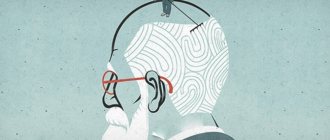Details Category: Symptoms
Decreased mood is a symptom of many mental disorders. In combination with other signs, it can serve as a marker of both neurotic and psychotic conditions: depressive disorder, bipolar affective disorder, chemical addiction, schizophrenia, schizoaffective disorder, organic brain damage, dementia and others
Characteristics of the condition
A persistent decrease in mood can develop under the influence of many factors.
Moreover, patients find themselves in a kind of vicious circle: hypothymia, provoked by depression, mental trauma and various neuroses, increases the intensity of these factors, as a result of which the functioning of the nervous system deteriorates. The true causes and mechanisms are not fully understood. The possibility of the influence of a hereditary factor cannot be excluded. Among the possible reasons for a persistent decline in mood are stressful situations and problems associated with the social and economic spheres of a person’s life.
Hypotymia, as a concomitant symptom, is also observed in the following pathologies:
- cyclothymia;
- dysthymia;
- schizophrenia;
- asthenia and other neurological and mental disorders.
This condition is one of the symptoms of depression of a different nature: neurosis-like, melancholy, anxious, and so on. Moreover, a persistent decrease in mood is observed in almost all patients with this disease.
Persistent depression of mood is diagnosed in people who have recently attempted suicide, as well as drug addicts.
In addition, hypothymia is caused by an environmental factor. This condition occurs as a result of a decrease in the level of immunity due to negative environmental influences. Due to the weakening of natural protective functions, the body reacts more sharply to stressful situations.
One of the possible causes of hypothymia is traumatic brain injury.
Types of Depression
Depression is considered a chronic disorder, as it is associated with biochemical disorders in the brain, the causes of which are still extremely difficult to trace. Depression affects people of all ages and both sexes in all countries of the world, with a preponderance, however, in favor of developed countries.
There are several types of depression. For the purposes of this article, we will limit ourselves to the main ones, without going into details.
1. Major depressive disorder or “major”, “clinical” depression. A constant feeling of hopelessness and despair that interferes with eating, sleeping, working, studying, maintaining relationships, or being interested in anything. People with this type of disease often have thoughts about death, which bring them short-term relief. If these people remain untreated for a long time, there is a high probability that suicide will be carried out. Major depressive disorder most often requires long-term medication treatment.
2. Dysthymia or “mild” depression is also characterized by impaired metabolism of brain neurotransmitters. Medications that can cause depression as a side effect, as well as problems at work or in interpersonal relationships, may play a role in the development of this disorder. The symptoms of dysthymia are similar to those of major depression, although not as pronounced as in the first case. However, dysthymia can seriously interfere with work or personal relationships and lead to a loss of sense of well-being. Despite the different name and the relative ease of manifestations, dysthymia is the same major depression, only in a mild, “erased” form; and therefore requires the same serious treatment as major depression.
3. Bipolar affective disorder (“bipolar disorder”, “manic-depressive disorder”). This disease is characterized by severe mood swings from depressive to manic. Depressive and manic periods are commonly called “episodes” or “phases.” The phases last for several months or even years, replacing each other or alternating with periods - sometimes long - of normal mood. During the depressive phase, a person experiences all the symptoms of major depression. During the manic phase, a person can be mobile, energetic, and active. He may not need sleep or food at all, and his thinking is replete with various innovative ideas, which, however, a person is not able to bring to completion due to the phenomenon called “leap of ideas” (fuga idearum). These ideas, as well as the decisions that a person makes in such a state, are often thoughtless or simply dangerous, and can cause significant harm to both himself and his environment. If left untreated, a person with bipolar disorder may commit murder or suicide. He may also develop full-blown psychosis with “voices” and delusional ideas, that is, with paranoid syndrome.
4. Postpartum depression can occur in 10-15% of women during the first three to four months after childbirth. The reason for it is a rapid drop in the level of female sex hormones (about ten times) compared to the period of pregnancy; and changes in social and interpersonal relationships associated with the birth of a baby. A small percentage of women may also develop postpartum psychosis. In this condition, constant consultations with a psychiatrist and supportive psychotherapy are necessary. Drug treatment is indicated if the potential harm to the health of the mother, left without treatment, exceeds the potential harm to the health of the baby due to the transfer to artificial feeding.
5. Seasonal depression (seasonal affective disorder) is a depressive disorder that occurs in the same person every year at the same time. As a rule, this disorder begins in the fall and reaches a peak in winter, when the light period of the day is shortest. This depression is associated with changes in the brain's production of substances that are normally produced in the brain when exposed to light. The best treatment for this type of depressive disorder is light therapy.
6. Psychotic depression - depression accompanied by “voices” and thoughts that someone is judging, persecuting a person, wants to harm him, torments him; replaces things, affects gas, rays, electric current, and so on. All the ideas described are called paranoid and are delusional because they cannot be dissuaded. In the case of a specific so-called depressive delusion, a person may be convinced that the whole world is collapsing, the end of the world is coming; that the organs inside his body are rotting, disintegrating and disappearing, which explains the painful emptiness, pain and insensibility he experiences (Cotard's delirium). Persons with psychotic forms of depression may be convinced that everyone around them hears their thoughts, and are also able to put foreign ones into their heads, while taking away those that belong to the patient himself (a symptom of “open thoughts”). Psychotic depression is observed in the structure of full-blown psychoses - both organic (post-traumatic, infectious, intoxication) and endogenous (schizophrenia, bipolar disorder). This depression also requires full-fledged drug treatment in a specialized medical institution with specially trained personnel, since its development poses an extremely high risk to both the life of the patient himself and the lives of the people around him. Psychoses are now highly treatable.
Component of the depressive triad
Hypotymia is one of the main components of the so-called depressive triad.
The latter also consists of bradyphrenia and hypobulia. The depressive triad is essentially a combination of three main symptoms that indicate the presence of depression. Bradyphrenia is characterized by the following phenomena:
- decrease in intellectual activity;
- deterioration in concentration;
- problems with remembering information.
The following symptoms are characteristic of hypobulia:
- motor retardation;
- increased fatigue.
The presence of the three above conditions contributes to the development of deep depression, which worsens the course of concomitant diseases. In particular, complications arise from pathologies of the nervous and cardiovascular systems.
Who develops depression?
Depressive disorder can develop in anyone, be it a child, a teenager, an adult, an elderly person, a woman or a man. The development of depression may be associated with problems at work or in interpersonal relationships; experience of loss; somatic diseases or taking medications (for example, some antihypertensive or chemotherapy drugs); a specific period of life associated with biochemical or hormonal changes in the body (puberty, pregnancy, postpartum period, menopause); deficiency in the body of certain substances (for example, vitamin Bc - folic acid, omega-3 fatty acids, tyrosine or tryptophan).
Ending here.
All materials on the site are presented for informational purposes only, approved by certified physician Mikhail Vasiliev, diploma series 064834, in accordance with license No. LO-77-005297 dated September 17, 2012, by a certified specialist in the field of psychiatry, certificate number 0177241425770.
What does a person experience and how does he see it to others?
It is possible to identify mental disorders from the outside based on the following signs:
- Decreased physical activity . A person in this state becomes more withdrawn. He minimizes contact with his environment and, in general, all physical activity.
- Decreased mental activity . A person ceases to be interested in any changes occurring around him.
A person in a state of hypothymia is constantly depressed. He experiences melancholy and feels sadness. His current condition is gradually worsening due to the fact that the patient cannot find a way out of the current situation. Moreover, he does not strive to find a solution to the problem.
In addition, the patient's self-esteem decreases. In severe cases, there is a tendency towards self-flagellation and self-accusation. A person loses faith in the future.
A persistent decrease in mood affects the body in the same way as a stressful situation affects it. This condition is characterized by the following set of symptoms:
- decreased appetite, resulting in weight loss;
- general weakness;
- pain in the chest and abdomen;
- sleep disturbance.
The individual does not experience joy from anything. This circumstance is a characteristic feature of the condition under consideration.
Factors influencing mood swings
Many factors contribute to severe mood swings, but some of the most important are nutrition, quality sleep and abuse of substances that have an active effect on the psyche.
To understand the importance of the influence of these factors, let's consider them in more detail.
- How does nutrition affect our mood? If a person follows a poor-quality diet and does not receive the required amount of nutrients, this can affect blood sugar levels: a feeling of constant hunger and malnutrition will appear. For example, if after drinking coffee in the morning you notice that you feel increased anxiety, agitation and restlessness, you most likely need to give up this drink and replace it with another.
Various types of digestive disorders that affect the body’s ability to absorb nutrients, celiac disease or inflammatory bowel disease (inflammatory bowel disease), can also cause constant mood swings and increase the risk of disturbances in a person’s psycho-emotional state, leading to depression.
- Sleep, its quality and quantity. Sleep affects your emotional state and causes mood swings. A person who is deprived of the necessary quality sleep is forced to experience chronic sleep deprivation, which leads to emotional mood swings.
Following a routine and getting enough sleep will give you vigor and calmness for the new day. The average healthy sleep for an adult per day is approximately 7.5 to 8.5 hours. When we sleep also matters for the body's circadian rhythm. The most favorable time for quality sleep begins at 10 p.m.
- Alcohol and drug abuse. People who use psychoactive drugs are very sensitive emotionally and are characterized by sudden fluctuations in mood. Such disorders can especially manifest themselves during attempts to give up these drugs, at which time withdrawal syndrome (withdrawal) appears.
Also, if drugs that affect mood are abused or misused, very serious unpleasant consequences can occur. Such erratic changes in emotional state are life-threatening, for example, due to the abuse of steroids by athletes.
A person who exhibits spontaneous frequent mood swings and suicidal tendencies needs urgent help from a psychotherapist.
Diagnostic features
Diagnosing hypothymia is quite difficult due to the fact that many people’s bad mood and low emotional background correspond to their character traits. Accordingly, neither the patient nor his environment can suspect the presence of the disease.
Diagnosis of a mental disorder is carried out through two questions and honest answers to them:
- What happened to your mood?
- What measures does the patient take to improve his mood?
If there is a suspicion of concomitant diseases, the symptom of which is hypothymia, laboratory and instrumental examination methods are prescribed.
What is depression?
First of all, this is a persistent long-term state (from two weeks to several months or even years) of depressed mood, which can be accompanied by pain in various parts of the body, the causes of which doctors are unable to find, despite all the examinations and tests. In addition, there are feelings of grief, sadness, melancholy, hopelessness, despair, apathy, or vice versa - severe anxiety with indifference to the environment, inability to experience any feeling; a person may suffer from a feeling of imminent death or desire it because the state in which he finds himself is unbearable. There may be sensations of an impending universal catastrophe or the gradual decomposition of the body from the inside; and many other symptoms.
Let's talk about everything in order.
Correction of an individual's condition
Treatment is determined depending on the cause that provoked the decrease in mood. But antidepressants that have a sedative or stimulating effect on the central nervous system are almost always used.
The first type of drugs is prescribed when there is a feeling of anxiety and irritability. To restore mental state and improve mood, use:
- Zoloft;
- Azafen;
- Coaxil and other medicines.
Stimulant antidepressants are indicated if the patient experiences persistent sadness and anxiety. In such circumstances the following applies:
- Fluoxetine;
- Milnacipran;
- Desipramine.
In addition to medication treatment, psychotherapeutic intervention is indicated for hypothymia.
It is designed to resolve internal conflicts, restore a person’s ability to socially communicate, and strengthen the will. When working with a patient, the doctor corrects his emotions, showing a way out of the current situation. Mood disorder is not a dangerous disorder. But as this problem develops, a person develops suicidal thoughts and a desire for self-torture.
Causes of decreased mood
One of the most common reasons is negative events. People often conflict with each other, they fail to achieve certain goals, and they suffer losses. All this contributes to worsening mood. Mental and physical stress should also be noted. In moderate quantities, they increase vitality. If there are too many of them, then physical and psycho-emotional exhaustion occurs.
With neuroses, a functional, reversible disorder of the nervous regulation of various functions occurs. One of the main manifestations of neurosis is deterioration in mood. It is worth noting that in connection with this there is an expression - “all diseases come from nerves.” It is believed that mood worsens due to a decrease in the amount of neurotransmitters in the nervous system. Neurotransmitters are hormones of joy. There is also such a problem as psychosis. They are an order of magnitude more serious than neuroses, and, as a rule, are irreversible personality disorders. The most common are schizophrenia and manic-depressive psychosis. The latter is noteworthy in that a person can be in a state of euphoria for a long period, but at one moment the mood suddenly changes to depressive.
Metabolism can also affect mood decline. A person may lack any enzyme or hormone: thyroid gland - thyroid-stimulating, adrenal gland - adrenocorticotropic, gonads. Thus, metabolism is disrupted, and this is reflected in the emotional-volitional area.
Almost every person knows the harm caused by alcohol and drugs. They negatively affect the central nervous system and worsen mood. Drugs block the flow of neurotransmitters, causing a person to become depressed and need a large amount of drugs.
A fairly common cause of mood deterioration is long-term use of medications. We are not talking about ordinary medications, but about certain groups: antihypertensives, psychotropic drugs and corticosteroids.
Prediction and distribution of depression
It is safe to say that depression is the most common psychological illness. It has been successfully treated for a long time; a specialist is able to restore the patient’s faith in himself in a few sessions. Most often, women who seek help are those who, due to their mental characteristics, are more susceptible to stress. Of the four ladies, one had to seek specialized medical help at least once in her life. Men are more resilient in this sense; only one in ten bothers psychologists with requests for help with a depressive episode. This prevalence of the disease is compensated by the fact that in 90% of cases, people who consult a doctor completely get rid of the disease.









